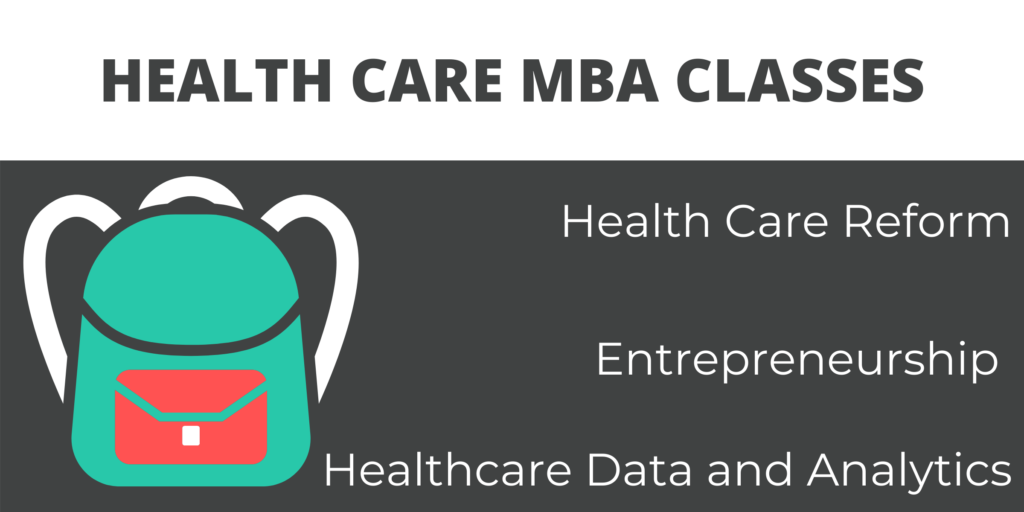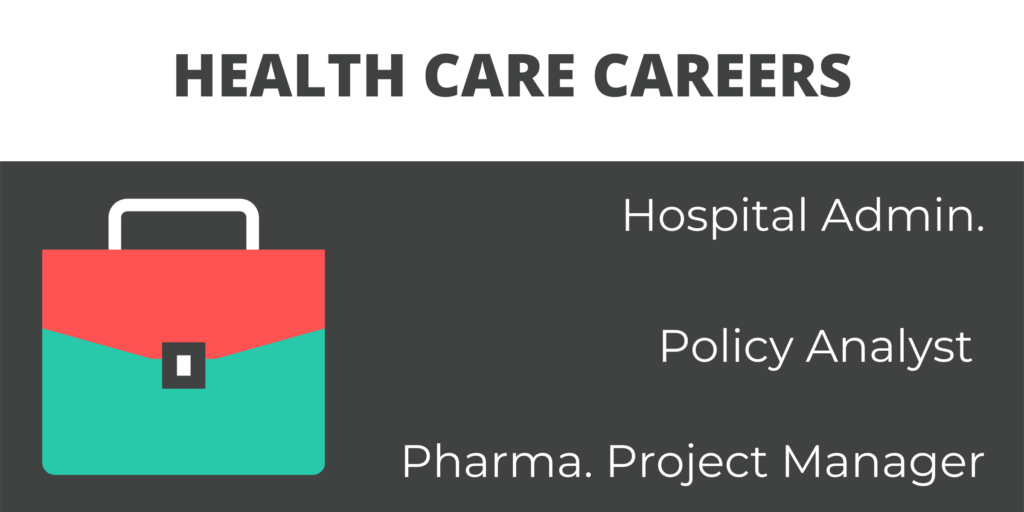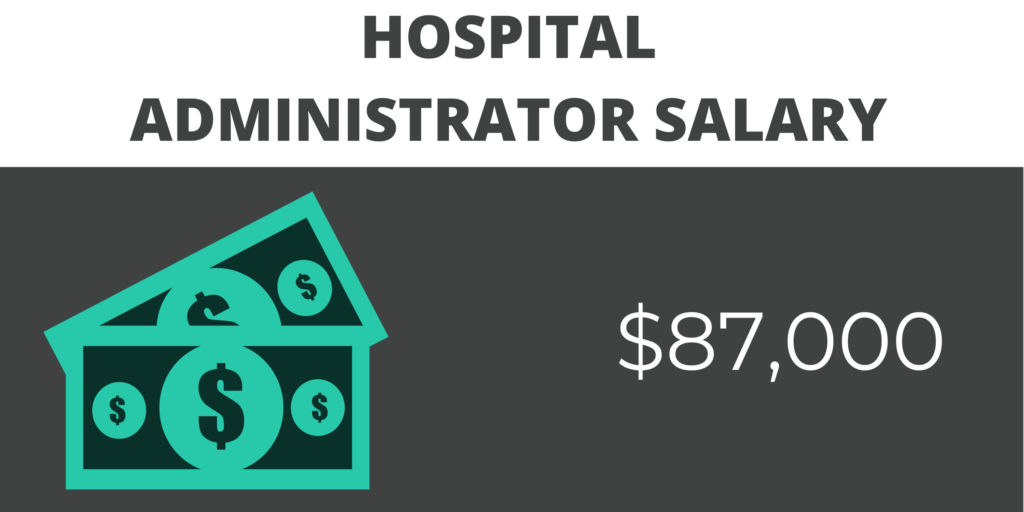The healthcare-business industry is one of the strongest sectors of the American economy and represents a prestigious profession. Professionals in this field work to save lives and work to ensure the successful operation of organizations that employ life-saving medical professionals such as doctors, nurses, and medical consultants.
But with great power comes great responsibility, and the healthcare industry is one of the most regulated markets in the country. And for good reason–people’s lives are at stake. So with this in mind, having the right education and sufficient training is crucial to building success–notably more so than in other professions where an individual’s high aptitude might be enough to carry them regardless of credentials.
In the business side of healthcare, professionals are held to as high a standard as the doctors are themselves. And for this reason, business professionals prospecting the healthcare industry should pursue a degree with clout and professional merit. Identifying the best programs can be a chore, but don’t worry. We have listed some of your best options below.
How do I know which professional credentials to pursue?
To make the most out of the education and credentially process, you will need to establish your chosen profession and specialty early-on, in fact, the earlier the better. The route to success for a business administrator in nonprofit healthcare will be entirely different than the route to success for a corporate executive with a large privately run hospital.

While there is certainly some flexibility on where students go after graduating from their degree program, career-trajectories will depend on a student’s chosen area of focus. In other words, you can either build a specialization by working in the industry or you can build toward specialization by enrolling in a specialized degree program.
How to choose the best degree program
Given the complexity of the healthcare industry, the variety of professional paths, and number of certifications–it can be an overwhelming challenge to identify your best options. So whether you are looking to earn a Healthcare MBA, or you want to know where you can go with it after graduation–look no further.
Healthcare-Business Education
- What Can I Do with a Healthcare Administration Bachelor’s Degree?
- What Can I Do with a Healthcare Administration Master’s Degree?
- 10 Fastest Online Healthcare Administration Bachelor’s Degrees for 2020
- 10 Fastest Online Healthcare Administration Master’s for 2020
- 10 Most Affordable Healthcare Administration Bachelor’s Degrees for 2020
- 10 Most Affordable Healthcare Administration Master’s for 2020
- 15 Best Online Healthcare Administration Bachelor’s Degrees for 2020
- 15 Best Online Healthcare Administration Master’s Programs for 2020
- 25 Best Healthcare Administration Bachelor’s Programs for 2020
- 25 Best Healthcare Administration Master’s Programs for 2020
MBA Programs: General Questions and Concerns
- What Can I Do with an MBA?
- Can I Get an MBA With Only a Liberal Arts Degree?
- Career Outlook For MBA’s
- Closing the Gap: The Rise of Women in MBA Programs
- How Quickly Can I Get an MBA?
- How to Choose a Quality MBA Program
- How To Choose An MBA Specialization
- International MBAs Vs Domestic MBAs
- Is an MBA Right for Someone Without a Business Degree?
- Should I Get an MBA Online?
- The Ultimate MBA Guide for Military Veterans
- What Career Can I Expect With an MBA?
- What is an MBA?
The Best Online Business Degree Opportunities
- Online Business Degree Opportunities: Arizona
- Online Business Degree Opportunities: Georgia
- Online Business Degree Opportunities: Illinois
- Online Business Degree Opportunities in California
- Online Business Degree Opportunities in Florida
- Online Business Degree Opportunities: Indiana
- Online Business Degree Opportunities: Massachusetts
- Online Business Degree Opportunities: Michigan
- Online Business Degree Opportunities: New Jersey
- Online Business Degree Opportunities: New York
- Online Business Degree Opportunities: North Carolina
- Online Business Degree Opportunities: Ohio
- Online Business Degree Opportunities: Pennsylvania
- Online Business Degree Opportunities: Texas
- Online Business Degree Opportunities: Virginia
- Online Business Degree Opportunities: Washington
What is a Career in Healthcare Business?
While doctors, surgeons, and nurses are the lifeblood of a hospital, the hospital administration ensures that the heart of the hospital keeps pumping. Hospital administrators work in a wide-range of positions to oversee the operations of a healthcare organization.
Healthcare is big business, and business professionals work hard everyday to ensure that it stays big and productive so that patients can stay healthy. But this profession is not limited to hospitals. Particularly in 2021, an increased focus on health is driving new models for healthcare business.

Healthcare-business professionals work as consultants–either for individual patients or large companies, they work as pharmaceutical company managers, and they work as administrators for healthcare companies of all sizes. In other words, wherever there is an organizational model in healthcare there is a need for business professionals to manage these organizations.
As such graduates of a Healthcare MBA can expect to work in positions such as:
- Consultancy Agencies
- Health Product Companies
- Hospitals
- Insurance Companies
- Lab & Testing Companies
- Long-Term Care Facilities
- Pharmaceutical Companies
- Rehabilitation Facilities
What is an Education in Healthcare-Business

An education in healthcare business may manifest in many different forms, however for the most part they will start in one area–that is, healthcare administration or healthcare management. Healthcare Administration degree programs look to position students for success in the burgeoning overlap of business interests with the evolving healthcare industry.
Programs are offered at various levels with a variety of degree specializations and concentration options on offer. Here is a breakdown of the most common degree paths in this profession:
- Associate’s Programs
- Associate’s of Healthcare Administration
- Associate’s of Healthcare Management
- Associate’s of Health Science
- Bachelor’s Programs
- Bachelor’s of Management in Healthcare
- Bachelor’s of Healthcare Administration
- Bachelor’s of Healthcare Management
- Bachelor’s of Health Science
- Bachelor’s of Nonprofit Healthcare Administration
- Bachelor’s of Public Health
- Bachelor’s of Public Health Administration
- Master’s Programs
- Master of Business Administration (MBA) in Healthcare
- Master’s of Management in Healthcare
- Master of Science in Healthcare Management
- Master’s of Healthcare Administration
- Master’s of Nonprofit Healthcare Administration
- Master’s of Health Science
- Master’s of Public Health
- Master’s of Public Health Administration
One of the primary distinctions to make in healthcare business education is whether ‘business’ is at the forefront or foreground of one’s education. Some programs such as those in health science will focus more on curriculum that explores the medical field, whereas programs in healthcare administration and healthcare management will focus curriculum on–you guessed it–business fundamentals.
For the purposes of this guide, we will focus on the Master’s of Business Administration in Healthcare, but these points were made to demonstrate that you can begin working toward a healthcare business specialization at any level of education.
What is a Healthcare MBA?
A Healthcare MBA integrates health care academics with a foundational education in business fundamentals in order to position students to take on positions of leadership in the field after graduation. Students of Healthcare MBA will get the best of both worlds–they will learn how the healthcare industry operates from the ground up, while also learning how to implement proven business strategies to elevate healthcare organizations.
For this reason, an MBA in Healthcare is a highly regarded degree for graduates entering the market. Even a highly experienced business professional would be hard-pressed to navigate the healthcare industry without previous experience in the healthcare market. And for this reason, graduates of a Healthcare MBA are perfectly positioned to take on high-end management positions, beating out competition even if they have more business experience.

Moreover, students of a Healthcare MBA can further hone their competitive edge by building towards a specialization. Many Healthcare MBA programs offer a catalogue of electives, research projects, and internship opportunities–all of which work to confer a professional speciality. But more on specializations shortly, let’s look at the typical curriculum for a healthcare MBA:
Base Healthcare MBA Curriculum
Note: Some programs may take a different approach to curriculums, but these are typically subjects of primary interest in a Healthcare MBA.
- Accounting
- Delivery of Health Services
- Economics
- Government Policy and Regulation
- Healthcare Business Ethics
- Healthcare Finance
- Healthcare Regulations
- Hospital Administration
- Marketing
- Leadership & Management Fundamentals
- Operations Management
- Organizational Models
- Statistics
Healthcare MBA Curriculum Electives
- E-Health: Business Models and Impact
- Financial Management of Health Institutions
- Global Healthcare Economics
- Health Care Entrepreneurship
- Health Care Reform and the Future of the American Health System
- Health Services Delivery: A Managerial Economic Approach
- Healthcare Data & Analytics
- Comparative Health Care Systems
- Medical Devices
- Management of Care for the Elderly
- Managed Care and Market Structure
- Managing Health Care Organizations
- Management and Economics of Pharmaceutical and Biotechnology Industry
- Private Sector Healthcare Industry
Healthcare MBA Degree Specializations
Healthcare MBA degree specializations can be conferred in one of two ways–either directly through an official degree specialization, or indirectly through a student choosing electives, optional coursework, and additional projects in a targeted category.
The former is certainly the most guaranteed way to earn a specialization that future employers will recognize, however many schools might not offer the specialization that you are interested in, or there may not be an official specialization option for your interests at all. In any case, students who wish to carve out their own path–in terms of an academic specialization–can build towards specialization through choosing key electives, research projects, and internship opportunities.
The capability of a Healthcare MBA program to confer a specialization will depend on the particular program and the school offering the program, however we find that some of the best programs offer options in these areas:
- Biotechnology and Pharmaceutical Strategy
- Consulting
- Global Healthcare Perspectives
- Healthcare Business Models
- Healthcare Technology
- Healthcare Law
- Healthcare Provider Strategy and Operations
- Innovation and Entrepreneurship
- Investments in Healthcare
- Medical Product Commercialization
- Pharmaceutical Testing and Diagnostics
- Quantitative Analysis
Master’s of Public Health Versus Healthcare MBA

An important distinction to explore is the difference between a Master’s of Public Health (MPH) and a Healthcare MBA. The differences are subtle in some regards and drastic in others, so understanding the difference between the two is crucial for making the right decision for your education.
A Healthcare MBA is arguably the more flexible degree, as it allows students to pursue study in various explorations of business without any stipulation regarding organizational structure. An MPH program on the other hand stipulates a curriculum-focus on governmental infrastructure, policies, and regulations–as well as further considerations relating to public health issues.
However, some programs like Boston University offer MBA + MPH degree programs. Students who have an interest in building specialization in one of the subjects below should consider further study of MPH curriculum:
- Biostatistics
- Epidemiology
- Social and Behavioral Determinants of Health
- Management Sciences
- Public Health Problem-Solving
- Computer Applications
- Demography
- Environmental Health
- Biological Sciences
- Public Health Policy
As you can see an MPH emphasises epidemiology, public and environmental health, and public policies. So if you want to work at the intersection of the healthcare industry, politics, and public interests–this might be the specialization for you.
Master’s of Health Administration Versus Healthcare MBA
The distinction between a Healthcare MBA and a Master’s of Health Administration (MHA) is much less clear. The most notable difference though is that Master’s of Healthcare Administration programs look to position students for quick entry into the healthcare industry. These programs are designed for students who might not have the robust and highly targeted education expected of applicants in an MBA program.

MBA programs typically require students to have a strong academic record as well as a five years or more of business experience–typically counting from after the time of college graduation. If you consider the average time-investment of a Bachelor of Business program, this equates to around 9 – 10 years of total experience in order to earn enrollment in a top MBA program.
So an MHA program cators to students who may not have this extensive background, but who are qualified to build a career in the healthcare industry. This is an excellent path to the job market for individuals who want to begin working as quickly as possible.
Evolving Sectors of the Healthcare Industry in 2021 and Beyond
What you can do with a Healthcare MBA will depend almost entirely on what the industry is doing. Healthcare as an industry follows a ‘best practices’ model where the majority sentiment dictates what is the correct path for the market. This has traditionally explained the healthcare industries resistance to adopt burgeoning technology.
In 2021 the healthcare industry seems to finally be shrugging off this hyper-conservatism, and as such the healthcare-technology industry is booming. Here is a breakdown of some interesting facts and statistics that signal the evolving market:
- Most people report being more comfortable digital visits with physicians
- More than 60% of healthcare organizations are introducing IoT technology (Internet of Things)
- The IoT market is nearly half-comprised of healthcare enterprises
- More than 1 out of 10 people are using a connected medical device
- China is leading this charge however, with nearly 1 in 3 using one
- Nearly 3 out of 4 people report being more comfortable with sharing personal information if it improves healthcare outcomes
- Around 7 out of 10 physicians report that health apps will drive industry-wide improvements
- At-home diagnostics and test kits are becoming pillars healthcare technology
Healthcare Technology
As mentioned above, some of the most promising sectors to move into with a Healthcare MBA will be markets that best represent the intersection of business, technology, and medicine. Business leaders are at the helm of new companies coming to market with innovative tech and products.
Business professionals looking to join in on this surge of growth should look to these areas of development: t-home test kits, connected medical devices, healthcare databases, internet technology, health apps, and other healthcare software and applications.
The IoT (Internet of Things) technology is another big player in the healthcare industry–it refers to the increasingly mainstream push for physical devices of all kinds to be optimized through a connection to the internet. As more healthcare organizations ‘plug-in’ to internet technology there is a growing demand for specialized business professionals to sell these products and functionalities. And as more products enter the market, competition becomes more fierce–and organizations rely more heavily on business leaders to position them for success.
Technology-minded students of a Healthcare MBA program should consider pursuing research projects, electives, or internship opportunities in the above mentioned sectors. This will hone their competitive edge and increase the likelihood of top-tier employment within their desired sector after graduation. Regardless, even if you wish to work in a traditional sector of healthcare management, the demand for technologically savvy business leaders in healthcare cannot be overstated.
Healthcare Management and Administration Job Profile
An MBA is a notoriously expensive degree, and so students will want the reassurance that the job market they are set to enter after graduation will offer the returns that justify such an expensive investment in higher education. Luckily for students looking to break into the ‘Health and Medical Services Managers’ sector, they will have this reassurance and more.

According to the BLS, the Health and Medical Services Managers job market is set to grow a jaw-dropping 32% from 2019 to 2029. Compare this to the national average of job market growth in the United States economy of 4%. In other words, the Health and Medical Services Managers job market is projected to grow 8 times faster than the national average for job growth.
What’s more is that earning potential looks very promising as well with some industries offering tremendous growth potential. So let’s take a deeper look at the job market profile:
Health and Medical Services Manager Profile
- 422,300 Health and Medical Services Manager positions in 2019
- Set to grow at a rate of 32% through 2029
- 2019 median annual salary was $100,980 per year
- Equates to hourly wage of $48.55
- Bottom 10% of managers earned less than $58,820
- Top 10% of managers earned more than $189,000
- The typical education requirement of entry-level jobs was Bachelor’s degree
- The typical work experience requirement was less than 5 years
- Managers may work more than 40 hours per week
- Emergency medical services may require managers to be available around the clock
One takeaway here is that while entry-level management positions only require a Bachelor’s degree, professionals who wish to earn the top-end salaries suggested above will want to earn a more advanced education. This is a tremendously supportive argument for the value of a Healthcare MBA, since qualified managers will be more likely to land the high-end positions with top-tier salaries.
Most Promising Sectors of the Job Market
- Government
- Annual Median Salary – $111,520
- Hospitals; State, Local, and Private
- Annual Median Salary – $110,430
- Outpatient Care Centers
- Annual Median Salary – $95,320
- Offices of Physicians
- Annual Median Salary – $91,600
- Nursing and Residential Care Facilities
- Annual Median Salary – $86,820
What is most surprising about these numbers is that the government is usually least competitive when it comes to compensation opportunities in the job market. The managing (or mismanaging) of federal budgets typically leads to conservative salary offerings. This however, does not seem to be the case with health and medical services management, in fact, government-funded salaries exceed the median salary of the private market, albeit not by much.
Let’s take a look a little closer at the industries in which these jobs are positioned:
Most Promising Industries for Medical and Health Services Management
- General Medical and Surgical Hospitals
- Number of Jobs – 125,230
- Average Annual Salary – $124,180
- Hourly equivalent – $59.70
- Offices of Physicians
- Number of Jobs – 48,780
- Average Annual Salary – $108,750
- Hourly equivalent – $52.28
- Outpatient Care Centers
- Number of Jobs – 28,170
- Average Annual Salary – $110,530
- Hourly equivalent – $53.14
- Nursing Care Facilities (Skilled Nursing Facilities)
- Number of Jobs – 25,780
- Average Annual Salary – $97,300
- Hourly equivalent – $46.78
- Home Health Care Services
- Number of Jobs – 21,190
- Average Annual Salary – $97,560
- Hourly equivalent – $46.90
One thing to note here is that pursuing jobs in the right location is nearly as important–and arguably more important–than the specifics of one’s education (to an extent of course: bachelor’s degrees are typically universally required for entry-level positions).
With that in mind, let’s look at the states with the largest job markets for Health and Medical Services Managers. Because the states with the largest job markets don’t always offer the best compensation opportunities:
Health and Medical Services Manager Employment by State
- California
- Number of Jobs – 36,940
- Average Annual Salary – $133,040
- Hourly equivalent – $63.96
- Texas
- Number of Jobs – 33,320
- Average Annual Salary – $107,880
- Hourly equivalent – $51.87
- New York
- Number of Jobs – 25,740
- Average Annual Salary – $147,000
- Hourly equivalent – $70.67
- Pennsylvania
- Number of Jobs – 17,330
- Average Annual Salary – $98,560
- Hourly equivalent – $47.39 17,330
- Massachusetts
- Number of Jobs – 15,810
- Average Annual Salary – $132,960
- Hourly equivalent – $63.92
Armed with the information in this guide, you should be ready to make the best of your education and you should have a good idea of which sector of the market you want to enter–and better yet, where and how to target those positions for maximum returns.
Carrie Morris
Author
Warren Dahl
Editor-in-Chief

